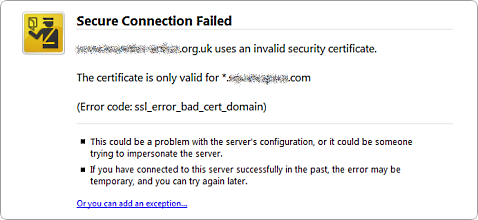IT support: Cut the jargon or find another job

I had a phone call from an extended colleague working for a charity here in the UK. The website they have is throwing up SSL error messages due to the extended security in modern day browsers - Internet Explorer 8 and Firefox 3 are the best examples.
The domain name for the site stands, but the website is hosted by another company which has an SSL certificate for their own subdomain, which covers this charity's website and every other website they host. When accessing the members-only part of the site, they are faced with an SSL certificate error, which is causing havoc with non-technical users and deterring them from using the site.
So from the charity's domain name, hit the Login button and it throws an SSL error because the SSL certificate is issued to the hosting company's subdomain, and not the charity's domain name. It's a domain name mismatch issue and quite common nowadays. Keeping up?

Their support response was to "advise your visitors to ignore this warning". That threw me back quite some way. Is that really the best solution? Or perhaps installing another SSL certificate to accommodate the additional domain name would have been a better idea?
This colleague got in touch with me to ask for my advice after emailing back and forth for weeks, ladies and gentlemen. Weeks.
The first question she had asked was in fact spot on, "Can just purchase a certificate to cover our domain name?" Instead of giving her a valid response, they quite simply bounced around jargon and technical bull which would have made very little sense to someone outside of the IT community.
This happens every day, in every organisation, and this is what I truly hate - hate - about the computing industry. It's the self-important, arrogant nonsense which IT professionals bounce around. They use language which confuses the lay person and causes them to feel inferior, when in fact they are the paying customer.
The reason people ask me for advice is because I don't bounce around technical language, or when I absolutely must, I explain it in almost gratuitous detail so they actually learn from what I say. More often than not, they don't just want an answer or a solution to the problem; they want to know what the problem was and learn from it.
One of my friends working for the Home Office didn't go in for two days claiming she was ill, because she was too terrified to speak to the IT technician on call, because of the flurry of patronising and condescending comments she would have to endure as a result of not knowing something.
Another example was last year. I went to the IT support desk at the university with a friend whose laptop was playing up. I was hungover and tired, and didn't have the energy. But I went for morale support because English wasn't her first language. From memory, this is how it went:
IT support: "So what's the problem?" Friend: "The Internet won't work. I plug it in and network doesn't connect. I need to submit my work otherwise my marks will be zero." [Bad English, I told you] IT support: [sighed and rolled eyes] "Fine, open it up." [The laptop loaded and she put in her password] IT support: "Well it's clear to me that the DNS cache is clogged and needs to be refreshed, so I'll open up a command prompt and flush out the DNS. I'll resolve it and the IP configuration will automatically reset. If you [something, something] the DNS resolver will fail and the connectivity will cease."
All good and well to me, as I understood roughly what was happening. For some reason, the DNS cache needed flushing out and the slate needed to be wiped clean. He did this in a matter of seconds and it was all good and well.
She left that office with a negative experience. But it was his fault, the spotty, rude and arrogant idiot who clearly shouldn't be in a public facing job if he cannot grasp the concept of basic social skills.
So this is a plea to the IT community. For crying out loud, get a grip. Sure, you may hate your job and hate people asking you for advice when their computers or devices screw up. But you are a specialist in your field and are respected for knowing that knowledge.
So pull your finger out and learn some social skills, because I can tell you now, ladies and gentlemen, that the Generation Y will not put up with your attitudes. The Generation Y do not appreciate being patronised because we're younger. The Generation Y will rip you to shreds.